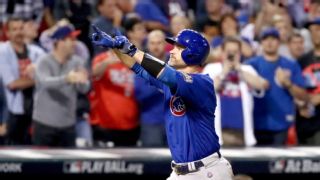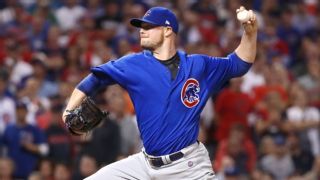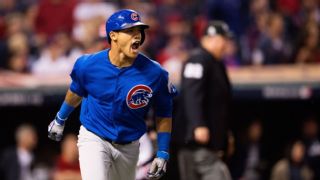|
CLEVELAND -- It all began with a baseball bromance. With the Chicago Cubs trailing Cleveland 3-games-to-1 in the World Series, manager Joe Maddon handed the ball to veteran lefty Jon Lester with a plea to save the season. And where Jon Lester goes, his good friend and personal catcher, David Ross, is sure to follow. The comeback continued with a road win at Progressive Field, followed by another, and finally a celebration in the visiting clubhouse early Thursday morning. With an 8-7, 10-inning victory over the Cleveland Indians in Game 7, the Cubs brought a halt to 108 years of parade-free baseball on Chicago's North Side. They also scripted a neat twist ending to a season that could have easily spiraled in the opposite direction.  Think back to Saturday night, and things were looking grim for the Cubs in their quest to break the franchise's title drought. Corey Kluber was cutting a swath through the Chicago lineup, John Lackey was grousing about the strike zone, and the Indians seized control of the series with a 7-2 victory in Game 4. Every move by Indians manager Terry Francona seemed to go smoothly, and even when there was room for debate, Kluber, Andrew Miller and Cody Allen were so dominant it didn't matter. But the Cubs sensed they weren't finished, and the people who watched them all season thought the same. For all the talk about the Cubs dominating the competition with 103 regular-season victories, they endured enough character builders to know what they were capable of when truly challenged. A prime case in point: The National League Championship Series, when they fell behind the Dodgers 2-1 before outscoring Los Angeles 23-6 over the final three games. "We never quit," Lester said. "That's been kind of our motto the whole year. I know people kind of laugh at us. We won 103 games and the guys in here act like we grinded out the season. But we really did. We had stretches where we didn't play all that well and guys didn't pitch well, or hit well, or play good defense. But we kept the mindset of 'We'll show up today and play and see what happens.' That's a testament to the guys in here." Lester pitched six effective innings in Game 5, and Ross drove in the eventual winning run with a sacrifice fly before receiving a shoutout from Pearl Jam frontman Eddie Vedder during the seventh-inning stretch. And Maddon, perhaps inspired by Francona's unorthodox use of Miller, stretched out closer Aroldis Chapman for eight outs and 42 pitches as the Cubs squeezed out a 3-2 win to send it back to Cleveland.  In hindsight, the trip back to Cleveland for Games 6 and 7 might have been therapeutic for the Cubs. They had a chance to take a deep breath and reassess, away from the intense scrutiny that has followed them since the start of spring training. They had also developed a comfort level with Progressive Field after splitting the first two games of the series. "We had already seen everything we needed to see,'' outfielder Jason Heyward said. "We saw Kluber in the first game. Kluber is going to be Kluber. If he has it going, he has it going. If he doesn't, you have to try to maximize the situation, because his worst day is a lot of other people's best day." Kluber notwithstanding, Maddon and the Cubs were perfectly content with the Games 6 and 7 pitching matchups. While Chicago's Jake Arrieta and Kyle Hendricks were both going on full rest, their Cleveland counterparts, Josh Tomlin and Kluber, were being pushed to the limit on three days' rest. The Cubs also accrued some tangible benefits from playing under American League rules. Kyle Schwarber, who was available strictly as a pinch hitter during the National League leg of the series, was back in the lineup at designated hitter and hit .438 (7-for-16) in the four games at Progressive Field. With so many Cubs fans in the stands, it sure didn't seem like a hostile environment. Indeed, the pivotal moment in Chicago's 9-3 victory in Game 6 came when an Addison Russell fly ball dropped between Cleveland outfielders Tyler Naquin and Lonnie Chisenhall for a gift double. Not long afterward, Russell gave Cubs fans even more reason to cheer with a grand slam off Dan Otero. "There was a lot of blue in the stands -- Cubbie blue -- and they were waiting to erupt every time something went our way," Heyward said.  In Game 7, Chicago's lineup kept grinding out at-bats and the bullpen somehow survived. Chapman had almost nothing left in the tank for his 35 pitches, Carl Edwards Jr. and Mike Montgomery combined to close it out in the 10th inning, and Lester threw three innings in his first relief appearance since the 2007 season in Boston. This is what's commonly known as contributing to the cause. "I don't think anybody is super-comfortable with something they've never done," Lester said. "I've done it three times in my career, and that was a hell of a long time ago, when I still had stuff and it didn't matter. At this time of year, you do what you've got to do. Joe asked me to do it, and I'm not going to turn him down." The Cubs are in exclusive company having overcome a 3-1 deficit to win a World Series. They joined the 1903 Boston Pilgrims, 1925 and 1979 Pittsburgh Pirates, 1958 New York Yankees, 1968 Detroit Tigers and 1985 Kansas City Royals as one of seven teams to achieve the feat. While the Cubs' first title since 1908 is special enough without any extra bells and whistles, the veterans and young players on the roster can all take a smidge more gratification in having made history the hard way. That said, it might be a while before they grasp the true degree of difficulty of their achievement. "Some of the guys in here are so young, I really don't think they understand what they just accomplished," Lester said. "I don't think they'll understand it until they get a little bit older."
|

